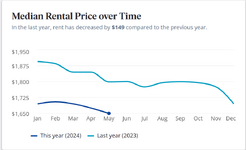Silver Lifetime
- Messages
- 43,613
- Reactions
- 113,633
- Thread Starter
- #961
Blaming the pandemic and not all the other fecal matter (including literally) that happened downtown:

 www.oregonlive.com
www.oregonlive.com
Downtown Portland’s TikTok-inspired Korean restaurant is closing
According to chef Peter Cho, many of his best ideas for the restaurant had come while scrolling TikTok.















